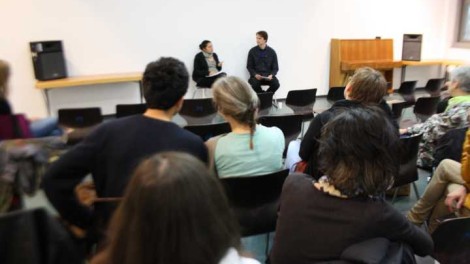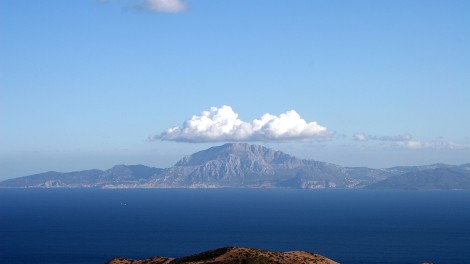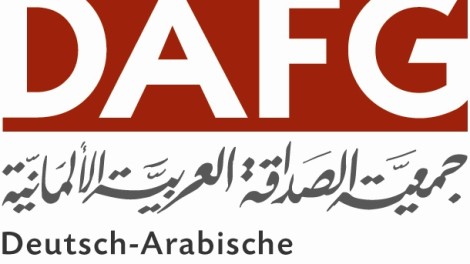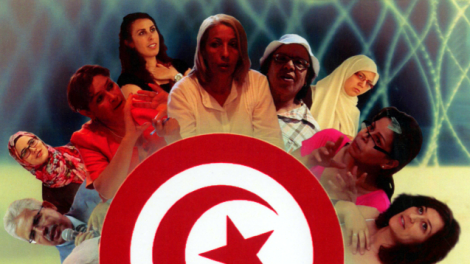Monthly Archives: June 2014
Tunesien – Ein Land auf der Suche nach seiner Identität
Mit dem Dokumentarfilm “Voices after Revolution” (Stimmen nach der Revolution) von Gisela Baumgratz, Alex Gangl und Nicolas Rolke fand am 25. Juni 2014 im Zille-Haus in Berlin-Moabit der vorläufige Abschluss der Arabischen Film- und Diskussionsreihe von 14km statt. Thema des Films war die politischen Lage in Tunesien unmittelbar nach den Umbrüchen 2011. Auf dem anschließenden Podiumsgespräch gab Amina Gharbi vom Verein zur Förderung der Demokratie in Tunesien den Impuls zu einer lebhaften Publikumsdiskussion. Der Film “Voices after Revolution” porträtiert die nach dem Sturz der Diktatur und den ersten freien Wahlen in Tunesien entfachten politischen Debatten aus der Sicht von tunesischen Menschenrechtsaktivist/innen. Zu Beginn thematisiert der Film die im Rahmen des Verfassungsgebungsprozesses entfachten Streitfragen, wie die Verankerung der Scharia in der Verfassung oder die Rolle der Frau in der tunesischen Gesellschaft. Das Ringen um den Erhalt der Frauenrechte aus dem Jahr 1956, die von islamistischen Kräften am liebsten durch religiöse Bevormundung ersetzt worden wäre, wird als Beispiel angeführt. In diesem Zusammenhang wird auch das Problem der während Ben Alis Herrschaft im Gefängnis radikalisierten und nun gewaltbereiten Salafisten angesprochen. Die für den Film interviewten Aktivist/innen kritisieren die Ziele und Methoden der islamistisch geprägten Regierungspartei Ennahda (2012), die die Wahl mit Propaganda, unrealistischen Versprechungen, der Instrumentalisierung von Religion und mit der nicht eingehaltenen Zusage, die Freiheitsrechte erhalten zu wollen, gewonnen habe. Kurz angerissen werden dabei Themen wie die Verhinderung der Vergangenheitsbewältigung von Anhängern des geflohenen Ex-Präsidenten Ben Ali und die Grundfrage, ob der Islam Lösungen für die ökonomischen Herausforderungen des Landes biete. Insgesamt wurde das Bild eines Landes gezeichnet, dessen politische Öffentlichkeit von einer kaum zu versöhnenden Gegenüberstellung von islamistisch und liberal orientierten Kräften geprägt ist. Im Anschluss erzählte die in Deutschland geborene, in Tunesien aufgewachsene und seit längerer Zeit wieder in Deutschland lebende Amina Gharbi beim Podiumsgespräch, wie sie die Umbrüche in Tunesien und die daraus resultierenden Debatten wahrnahm. Außerdem stellte sie die Tätigkeiten des 2011 gegründeten Vereins zur Förderung der Demokratie in Tunesien vor, der sich unter anderem mit der Frage der Vergangenheitsbewältigung beschäftigt. Einen festen Platz auf der diesjährigen Agenda des Vereins hätten die anstehenden Wahlen in Tunesien. Abschließend stellte sie ihren Eindruck zur Debatte, dass die jungen Tunesier/innen, die ursprünglich die Revolution entfacht hatten, mittlerweile erschöpft wirken. Zumindest auf die im Publikum anwesenden Tunesier/innen traf das nicht zu. Vielmehr begann eine angeregte und sehr sachliche Diskussion über den Film, bei der fast alle Teilnehmer/innen die überzeichnete Gegenüberstellung von “guten Liberalen“ und “bösen Islamisten“ kritisierten, da sie der komplexen Meinungslandschaft Tunesiens nicht gerecht werde. Der Film gebe den islamisch geprägten Parteien keine Möglichkeit, ihre Sicht der Dinge darzulegen. Selbst wenn es einem schwer falle, müsse man als Tunesier/in akzeptieren, dass ein Teil der tunesischen Gesellschaft islamistische Positionen beziehe. Auf absehbare Zeit werde dieser Teil politisch präsent bleiben und dürfe deshalb bei einer ehrlichen Auseinandersetzung um die Zukunft Tunesiens nicht ausgeschlossen werden, ohne dass die Fehler der Ben-Ali-Zeit wiederholt würden. Außerdem gehöre die Religion nicht nur den Islamisten, sondern auch den anderen politischen Lagern. Der politische Islam sei ein Teil Tunesiens. Angemerkt wurde zudem, dass nicht der Islamismus das größte Problem Tunesiens sei, sondern die Frage nach der Identität. Tunesien mit seiner dreitausendjährigen Geschichte befände sich in einem Aushandlungsprozess um seine Identität. Die Menschen des Landes müssten als Berber, als Araber, als Muslime, als Tunesier, als Mann, als Frau, usw. bestimmen, was sie eigentlich sein wollen. In den letzten Jahrhunderten war dies von Kolonialmächten sowie – im Anschluss daran – unter zwei Diktaturen “von oben” vorgegeben worden. Seit der Revolution sei zum ersten Mal seit Langem auch der tunesischen Zivilgesellschaft die Möglichkeit gegeben, sich an dieser grundlegenden Debatte beteiligen zu können. Organisiert und moderiert wurde die Veranstaltung von Andreas Fricke (14km e.V.). Fotografie durch Joe Kaldas, Text Steffen Benzler (14km e.V.). Bei der Organisation halfen Mai Micklisch, Shaza Nady und Anja Gebel (alle 14km e.V.), sowie das Team des Zille-Hauses. Das Restaurant Karthago in Charlottenburg sponsorte tunesische Leckereien. Der Jugendbereich des Zille-Hauses wird getragen vom Evangelischen Klubheim. Wir bedanken uns bei allen Gästen für ihr Kommen! Weitere Informationen zur Lage in Tunesien finden Sie hier: Bertelsmann-Stiftung SWP Blog von Zeineb Ben Othman In regelmäßigen Abständen zeigen wir Filme, die sich mit verschiedenen arabischen Ländern beschäftigen und diskutieren anschließend mit Gästen aus Moabit sowie mit Länder-Expert/innen über die Filme und die aktuelle soziale und politische Situation im jeweiligen Land. Das Projekt wird im Rahmen des Quartiersmanagements Moabit-Ost aus Mitteln des Programms Soziale Stadt (EU, Bund und Land Berlin) gefördert.
Symposium “Displacement // Migration // Development – Facets of Migration between North Africa and Europe”, 11/12 July 2014, Berlin
“14km e.V.” and the “DAFG – German-Arab Friendship Association e.V.” cordially invite you to a symposium on “Displacement // Migration // Development – Facets of Migration between North Africa and Europe”, 11/12 July 2014, Friedrichstr. 185 (House E, 7th Floor), 10117 Berlin The topic migration in the Euro-Mediterranean is directly linked to the political transformations in North Africa and the Middle East which have an increasing public interest in Germany. Also in North Africa, which has become an important transit region on the way to Europe, migration and transit migration are being problematised. 14km and the DAFG would like to shed light on the manifold migration backgrounds in the countries of origin and the migration situation there, put a focus on the social networks between the African and the European continent that are created by migration, and discuss their inherent potential. The two-day symposium is conceived in a participatory way and provides a low-threshold entry to the topic; it is directed to anyone interested in gaining a differentiated perspective on the issues or already engaged in some of them. The participants will have the opportunity to discuss, share ideas, present their own projects, network and find partners for new initiatives. Further information, conditions of participation, and soon the detailed programme can be found on our site: http://14km.org/?p=2651 The symposium is financially supported by funds from the Landesstelle für Entwicklungszusammenarbeit des Landes Berlin (Agency for Development Cooperation of the Federal State of Berlin). 14km Flyer Fachtagung Migration Download for Distribution! Photo credits: “Estrecho de Gibraltar” CC-by-Gaspar Serrano-NC-ND-2.0
Arab-German “Jour Fixe” for Young Academics – Workshop: Building an NGO
“Workshop: Building an NGO” on Monday, June 30th 2014 at 7:30pm, DAFG head office, Friedrichstr. 185 (Kontorhaus, House E, 7th Floor, Berlin) We cordially invite you to participate in the workshop "Building an NGO" at the 2nd meeting of the Arab-German "Jour Fixe" for Young Academics organised by the German-Arab Friendship Association (DAFG). Dr. Anja Gebel and Helena Burgrova of 14km e.V. will share their knowledge about how to build an NGO. Both speakers are committed to the non-profit NGO since its early days, having defined its strategy, built up organisational structures, and promoted the construction of an international network to help realise co-operations and equal partnerships between North Africa/the Middle East and Europe. They have also shaped the development of the NGO's main areas of work, such as the International Volunteer Programme that encourages the exchange between Europe and North Africa/the Middle East, and or the monthly Arab Film and Discussion Series. The workshop will give insights in defining an organisation's purpose and structure, project development and event organisation, volunteer recruitment, and PR work. But most importantly, we want to take time to brainstorm, share experiences, and to work on concrete NGO ideas together with the participants of the Jour Fixe. We would be happy to meet you at the event and have you share your thoughts and ideas with us. 14km's work is mainly based on voluntary work and new faces are always welcome! The Jour Fixe is open for English-speaking students of all disciplines and universities. The event will take place in English. It starts at 19:30 and ends with a joint "Iftar" (Muslim fast-breaking dinner after sunset during Ramadan). For registration please send an e-mail to DAFG e.V.: David Kordon Desk Officer Culture, Education and Science E-Mail: david.kordon@dafg.eu Phone: +49 (0)30 2064 94 13 Fax: +49 (0)30 2064 88 89 WorkshopFlyer download and share! Facebook-Group Report about the workshop
Eugénie Rooke’s time with 14km in Berlin – an internship report
"As I was looking for an internship in the field of intercultural cooperation last year, I saw the call for applications at the office of 14km e.V. in Berlin. I was directly interested in the projects of this young NGO and decided to apply. After my application in Berlin was accepted, Anja Gebel, the PR & Program manager, proposed me to apply for another internship in one of the partner organisations in the MENA region, since I had time for it. After this amazing experience in Lebanon, I started my internship at 14km in Berlin in the middle of April. Of course it was an asset for me to have been in Lebanon before starting my internship with 14km, as one of my first tasks in Berlin was to search for new partner organisations in Lebanon. It is easier to work in cooperation with the MENA region when you already have been there and acquired certain knowledge of the social and political situation. Since the beginning of my internship in Berlin, I was agreeably surprised to see that I could help in many different areas. I didn't expect to be involved in so many different and interesting projects and events. Indeed, I helped in the organisation of the first 14km network party, the Arabic film evening about Lebanon, the event on “The State of the media in Egypt”, the organisation of a study trip of young Libyans to Berlin and at last the symposium about migration and development. I was glad to see that I could help in different ways: I searched for experts for the migration symposium; I looked for, chose and contacted new potential partner organisations for the volunteer program; I wrote a report on the networking party; I translated some articles for the website; I updated the program for the study trip of the Libyans; I searched for hostels and conference rooms; I sent our call for interns to French universities; I created invitations for the event “The state of the media in Egypt”; I sent invitations to our contacts for two different events; and of course I helped during the events 14km held when I was there. During this internship, I learnt a lot in terms of public relations, communication, and editing content. I really appreciated the diversity of my tasks (research, translation, PR, update of the website, etc). In doing an internship with a small NGO, I wanted to learn more about the way it works and develops projects, the way to manage such a structure, how it functions. I could say that I discovered all those things during my internship. Since I really appreciated my time in Lebanon and wished I could have stayed there longer, it was also an opportunity for me to “stay in touch” with this country and with the MENA region and to continue the cooperation. As for my relation with the staff, I could say that the team of 14km is young, dynamic and professional. As the team is growing fast, we also spoke with Anja about the way 14km could (re)organise itself in the future, which was also relevant for me. The volunteers helping 14km are very motivated, committed and have a lot of good ideas for future projects. In conclusion, I really enjoyed my internship at 14km for a lot of reasons: I could assist to interesting events, develop my skills in a lot of fields, know the German actors of the Europe-MENA relations and cooperation, which made my internship at 14km a successful experience. As I already completed an internship in a bigger public structure, I could say that I appreciated more the work in a small NGO: we feel more useful, we have more responsibilities, we have the opportunity to carry out more tasks. One thing is certain: I will keep a very positive impression of my time by 14km, regarding all I learnt and did. I really want to thank Anja Gebel, who is doing an amazing work, for her patience, her trust and for all the opportunities she gave me. She took the time for each project to explain me the whole background and that she assigned me a lot of diverse tasks. I wish I could continue to help 14km in one way or another because this NGO really deserves all the best for all the work the team accomplishes!" The published reports by interns/volunteers on their internships facilitated by 14km e.V. do not necessarily reflect the opinion of 14km e.V. or its partners. Photo credits: Berlin_Björn Giesenbauer_flickr_cc-by-nc-sa-2.0
Arab Film and Discussion Evening on Tunisia, June 25th, 2014
“Voices After Revolution” on Wednesday, June 25th 2014 at 6:00pm, Zille-Haus, Rathenower Straße 17, Berlin Moabit We cordially invite you to our film and discussion evening on Tunisia, which will take place on June 25th at 6:00 pm in the context of our Arab Film and Discussion Series. We will be screening the film „Voices After Revolution“ by Gisela Baumgratz, Alex Gangl and Nicolas Rolke (2013; 67 min; French, English, Arabic, German – with German subtitles). In the film, Tunisian activists describe vividly their experiences in 2012, after the fall of the dictatorship and the first free elections. The process of democratization and the goals of the revolution obviously need a lot of continuous commitment. Therefore they go on to fight for human and civil rights, better economic and social conditions and the separation of religion and state. The film will be followed by an open conversation and audience discussion in presence of an expert and further guests on the situation in Tunisia 2010-2012 and current developments, as well as on the repercussions on Tunisian migrants in Moabit and Berlin. Attendance is free, donations are welcome. The event will take place at Zille-Haus, Berlin Moabit, Rathenower Str. 17, 10559 Berlin. Please use the fliers to get to the youth club in which the event takes place. You can see here where the Zille-Haus is located. In regular intervals we screen films which deal with different Arab countries and subsequently discuss the films and the current social and political situation in the respective countries with guests from Berlin Moabit as well as with country experts, always aiming to make links to North-South relationships. أمسيةالفيلمالعربي وجلسة حوارحول تونس 25 /ماي/2014، 6:00 مساءً في التزيلي هاوس شارع راتنوفر 17، 10559 موابيت برلين ستقوم مؤسسة 14كم بعرض الفيلم الوثائقي "أصوات ما بعد الثورة" للمخرجين غيزيلا باومغراتز، وأليكس غانغل، ونيكولاس رولكه (67،2013 دقيقة، اللغة العربية والألمانية والفرنسية والإنجليزية مع ترجمة باللغة الألمانية). في الفيلم، يصف نشطاء تونس بوضوح تجاربهم في عام 2012، بعد سقوط الدكتاتورية وإجراء أول انتخابات حرة. سيعقب الفيلم نقاش مفتوح حول الوضع في تونس في ذلك الوقت من الثورة،فضلا عن تداعيات ذلك على المهاجرين التونسين في موابيت وبرلين. الحضورمجاني، والتبرعاتمرحببها. TunesiaFlyer download and share! Facebook-Event Xing-Event The project receives financial support in the context of the quarter management Moabit Ost through funds from the Programme Social City (EU, Federal Government, and Federal State of Berlin). German Introduction (Gisela Baumgratz, June 2014) Th film "Voices After Revolution" is offered by the film makers around Gisela Baumgratz-Gangl - University of Applied Siences Fulda. We thank Simone Döbbelin, Middle East and North Africa Department at Friedrich-Ebert-Stiftung, for providing the film copy.





